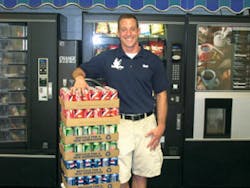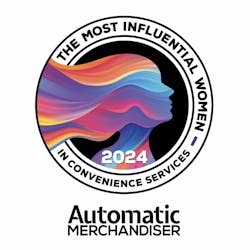A new generation is assuming leadership positions in automatic merchandising. It is a generation raised with an appreciation for technology, and anxious to see the industry win its proper place in American society.
As young people assume positions of leadership, the industry's reputation is bound to improve. Today's young managers have a positive attitude about the business.
Many of the young managers grew up in the industry. Unlike their parents, many of these younger managers have college educations. Many have also spent time working in other fields that have exposed them to new ways of doing things. At the same time, there are also plenty of industry newcomers who are just as ambitious about establishing successful careers as their forbears once were.
As the automatic merchandising industry struggles to improve its profitability in a competitive business climate, the new generation of managers are overall highly optimistic about their futures. Many are particularly excited about implementing new software, cashless transaction capability and remote machine monitoring.
Most of the new generation also believe in the importance of education on an ongoing basis. They believe that not only is education critical to the success of their employees, but of the customers. The customers, many claim, need to better understand the benefits that vending offers, such as options for better quality and healthier products.
Many also believe that they will be the first generation of vending professionals who will have the tools to fully understand the vending consumer.
And like their forbears, today's young vending managers have a great passion for the business.
Following is a selection of profiles of vending and OCS managers who are 30 years old and younger.
Matt Mongrain's parents instilled in him an appreciation for the importance of education. But while he was in college, he came across an opportunity to invest in a vending business. He felt an entrepreneurial urge and has never looked back.
In 2003, Mongrain, still in college, purchased a minority position and began working for the company. He found that he liked the vending business. He likes the fact that he can be out and about visiting businesses every day.
Four years after his initial investment, Mongrain and a partner bought out the owner. He is keeping a close eye on cashless vending capabilities. He recognizes that the younger generation does not carry cash, and cashless vending is an inevitability. He is waiting for it to become more cost effective.
A new generation is assuming leadership positions in automatic merchandising. It is a generation raised with an appreciation for technology, and anxious to see the industry win its proper place in American society.
As young people assume positions of leadership, the industry's reputation is bound to improve. Today's young managers have a positive attitude about the business.
Many of the young managers grew up in the industry. Unlike their parents, many of these younger managers have college educations. Many have also spent time working in other fields that have exposed them to new ways of doing things. At the same time, there are also plenty of industry newcomers who are just as ambitious about establishing successful careers as their forbears once were.
As the automatic merchandising industry struggles to improve its profitability in a competitive business climate, the new generation of managers are overall highly optimistic about their futures. Many are particularly excited about implementing new software, cashless transaction capability and remote machine monitoring.
Most of the new generation also believe in the importance of education on an ongoing basis. They believe that not only is education critical to the success of their employees, but of the customers. The customers, many claim, need to better understand the benefits that vending offers, such as options for better quality and healthier products.
Many also believe that they will be the first generation of vending professionals who will have the tools to fully understand the vending consumer.
And like their forbears, today's young vending managers have a great passion for the business.
Following is a selection of profiles of vending and OCS managers who are 30 years old and younger.
Matt Mongrain, 28, co-owner, Dove Vending LLC, Denver, Colo.
EDUCATION: High school diploma, some college
ROLE MODELS: Grandparents, aunts and uncles
LONG-TERM GOAL: To operate a profitable company
BIGGEST SURPRISE: None
OTHER CAREERS CONSIDERED: None
ASPECT OF THE BUSINESS MOST LIKED: Interacting with customers
Matt Mongrain's parents instilled in him an appreciation for the importance of education. But while he was in college, he came across an opportunity to invest in a vending business. He felt an entrepreneurial urge and has never looked back.
In 2003, Mongrain, still in college, purchased a minority position and began working for the company. He found that he liked the vending business. He likes the fact that he can be out and about visiting businesses every day.
Four years after his initial investment, Mongrain and a partner bought out the owner. He is keeping a close eye on cashless vending capabilities. He recognizes that the younger generation does not carry cash, and cashless vending is an inevitability. He is waiting for it to
Mike Klong, 30, co-owner, Classic Vending, Chicago, Ill.
EDUCATION: Undergraduate degree in business management, University of Colorado
ROLE MODEL: Doug Skor, formerly with World Wide Vending Inc., now with Wurlitzer
OTHER CAREERS CONSIDERED: Logistics
LONG-TERM GOAL: Chicago market leader
BIGGEST SURPRISE: Competitors' willingness to give high commissions
ASPECTS OF THE BUSINESS MOST LIKED: Excitement and competitiveness
Mike Klong thinks he got into the vending business at a good time when he and a partner founded Classic Vending in Chicago in 2000. Vending machines had become more versatile and reliable, and there were more products being made available to meet diverse customer needs.
The company began as a bulk vending operation. Shortly after buying the bulk route, Klong and his partner, Randy Nassiter, decided there was a better opportunity in full line vending and began soliciting full line accounts. The company has grown to include six combined vending and OCS routes.
The company recently reached a benchmark with the hiring of its first vice president, a veteran vending operator who has also worked in the equipment distribution side of the business.
Klong has since bought out his partner.
Klong feels that his relationship with his equipment supplier, who at the time was World Wide Vending Inc. in Chicago, was an important part of his success. Doug Skor, who has since moved on in his career as a sales executive for Wurlitzer, was willing to share his advice with the young startups. “He always gave us his time,” Klong said.
Technology has played an important role in the company's success, Klong said. All drivers use DEX handhelds. The main benefit is that it has enabled him to do item level tracking.
Klong expects that credit card readers will bring new opportunities for growth. He is keeping a close watch as the cost for the systems decreases.
Klong recently launched a healthy eating initiative called Vending for Vitality. He believes there are a lot of “better for you” products available in vending today, and this program highlights these items. He noted that most of these are available outside of traditional vending distribution.
The products include the following standards:
• No high fructose corn syrup or artificial sweeteners
• No trans fats or partially hydrogenated oils
• No artificial preservatives or colors
• Whole grain and high fiber foods
• Organic dairy products
• Nuts and dried fruit
• Fruit juices without added sugars
• Vitamin water and flavored waters
Klong believes success in healthy products requires customer education. “With education, people understand what you put in the machine,” he said. “It's hard to sell any of it.”
Klong claims the program has won him business.
Klong thinks getting a college education was important, mainly because it exposed him to so many different types of people. It also gave him a strong foundation in finance, which he deems important in vending. Entrepreneurial finance was the single most important course he took in college.
Klong has also set up a board of advisors for the company, consisting of himself, his vice president, his father, a former business owner, a
Jonathan Bartholomew, 26, purchasing manager, Corporate Services Group, Tampa, Fla.
EDUCATION: Undergraduate business degree at the University of Tampa
ROLE MODELS: Parents, Brad and Marie Bartholomew
LONG-TERM GOAL: To continue to build the business
BIGGEST SURPRISE: None
OTHER CAREERS CONSIDERED: Radio talk show host
ASPECT OF THE BUSINESS MOST LIKED: It's never dull
As the son of an entrepreneurial couple, Jonathan Bartholomew experienced his parents' passion for their work all throughout his childhood. The Bartholomews' company,
Corporate Services Group, is now a market leader in South Florida with six branches in addition to the headquarters and a total of 125 routes.
During his childhood, Jonathan Bartholomew handled numerous jobs, including working in the commissary making sandwiches, working in the warehouse and driving a delivery vehicle.
He joined the family businesses full-time after graduating with a business degree from the University of Tampa in 2005.
Like his parents, Jonathan Bartholomew loves the vending business. “Vending is like no other job,” he said. “Everything changes a lot faster in vending than in other industries.”
He also learned not to take anything for granted.
Corporate Services Group has been a pioneer in the use of DEX, credit card readers and remote machine monitoring. At present, the company has its routes all on DEX handhelds.
Like his parents, Jonathan Bartholomew believes that to succeed in a competitive market, it is necessary to have the most up-to-date technology. “You always have to be on the cutting edge,” he said.
“Information is the key to any business.”
The most challenging aspect of his present position is getting used to working with such large amounts of cash.
Russell Rider, 18, owner, Russell's Vending, LLC, Salt Lake City, Utah
EDUCATION: Presently enrolled at Salt Lake Community College
ROLE MODELS: Parents
LONG-TERM GOAL: To keep building the business
BIGGEST SURPRISE: Having to have surgery twice since age 15
OTHER CAREERS CONSIDERED: Aviation
ASPECTS OF THE BUSINESS MOST LIKED: Interacting with people, meeting new people, and having control of your time
Russell Rider is probably the youngest vending owner/operator in the U.S., although if you ask him, he doesn't feel so young. Since the age of 15, he has fought three battles with skin cancer. So far, he has managed to come out on top.
Shortly after his first diagnosis, Rider decided he needed to make the most out of life. Not old enough to drive, he placed a big gumball machine in a restaurant owned by a family friend.
The bulk machine's sales were so brisk that Rider was stunned. He socked away enough money to buy more bulk vending machines, and he went out and got more customers.
As the business grew, Rider had to juggle the norms of high school with his budding business.
By the time he was 16, Rider had graduated from bulk vending to full-line vending. While he was still in high school, his family moved from Waldorf, Md. to Salt Lake City, Utah.
He purchased a used bread delivery truck and outfitted it with shelves and a freezer.
Rider's first snack and soda account was a tire dealership. He currently has 22 customer locations.
His biggest challenge to date has been his age. He has missed out on some opportunities because people didn't think he was old enough to be a vending operator.
Rider said he has always been fascinated by vending machines.
He graduated high school last June and is currently enrolled at Salt Lake Community College in Salt Lake City. He will soon be transferring to University Valley State College to study aviation.
Rider claims his 22 vending locations, which he services in a few hours a week himself, have allowed him to cover much of the cost of his education.
Like his stepfather, a nuclear engineer, Rider is mechanical and has been able to handle most of his repairs himself. He rents 1,600 square feet of space in an industrial park.
One of his best accounts is a race track, which he got almost by accident. A manager at the race track had received his business card and called him.
Rider is particularly excited about the possibilities offered by Automated Vending Technologies, a company that markets a digital video screen on its machines. At the present time, Rider is using that system's USB stick, which enables him to download transaction data from the machine onto a laptop.
Rider is keeping an eye on the remote monitoring technology, but has not yet decided to invest in it.
As if he weren't busy enough with the business and school, Rider also makes time to volunteer for the local police auxiliary.
Jennifer Galloway, 30, marketing director, Sanese Services Inc., Columbus, Ohio
EDUCATION: Undergraduate degree in media studies and photography at Columbus College of Art Design
ROLE MODELS: Her parents
LONG-TERM GOAL: To grow with the company
BIGGEST SURPRISE: That such a large company can still be operated as a family business
OTHER CAREERS CONSIDERED: Photographer
ASPECT OF THE BUSINESS MOST LIKED: Each day is different
Jennifer Galloway, a professional graphic designer and photographer, has a big job on her hands meeting the needs of a company as big and diverse as Sanese Services Inc. in Columbus, Ohio.
While Galloway had worked as a graphic consultant to a variety of different types of businesses before joining Sanese Services full time, she never realized how demanding and challenging the position would be when she came as the marketing director a few years ago.
One reason the position is so demanding is that Sanese Services is involved in so many aspects of foodservice. Her biggest challenge is in fostering an identity for each part of the company; vending, foodservice, OCS, catering, etc. She is involved with all of the graphic materials, including print literature and the Website.
Sanese Services recognizes the need to present a professional image to all of its customers, Galloway said.
This is an exciting time to be in the vending business with all of the promise that technology is bringing, Galloway noted. Sanese Services has experimented with most of the new technologies the vending industry is using, including cashless transactions, remote machine monitoring, and new heating systems.
Sanese Services is one of a handful of vending operations that still operates the Hot Choice machines from KRh Thermal Systems which heat and dispense meals. “I think that it's going to open a lot of windows,” Galloway said.
Sanese Services is also part of a nationwide coalition of vending operators known as the Vend Marketing Institute (VMI). VMI was founded to create an organization that will benefit the affiliates, their customers and suppliers, through the development of joint marketing and purchasing programs.
One program, named “The Right Choice … for a Healthier You!”™, focuses on nutrition education, promoting an active lifestyle and the availability of nutritious choices when making vending selections.
Sanese Services has also been a leader in its use of Web technology. The company has a professional Website and has also utilized an e-mail newsletter for its customers.
Being the marketing director for a company as diverse as Sanese Services keeps Galloway on her toes. She appreciates the fact that the company maintains a strong sense of family despite its size.
Bradlee Whitson, Jr., 23, operations manager, K&R Vending Inc., Bridgeton, N.J.
EDUCATION: Undergraduate degreee in business administration, Rutgers University
ROLE MODEL: Father, Brad Whitson
LONG-TERM GOAL: To grow with the company
BIGGEST SURPRISE: None
OTHER CAREERS CONSIDERED: Sales and newspaper publishing
ASPECTS OF THE BUSINESS MOST LIKED: Constant challenge and new technology
As a third generation operator, Bradlee Whitson, Jr. has big shoes to fill. K & R Vending Inc. in Bridgeton, N.J. was started by his maternal grandfather and grand uncle, Konrad and Richard Stutzmann.
From childhood, Whitson learned about the vending business under the watchful eye of his father. While he liked the business, he wasn't sure he wanted to join the family business as a young man. He graduated from Rutgers University in New Brunswick, N.J. two years ago with a degree in business management.
Following graduation, Whitson took a job selling software in New York City, hoping to gain a better understanding of business in general. He believes he gained a solid understanding of how companies handle growth and change.
When K& R Vending acquired a long-time competitor in Bridgeton several months ago, Whitson decided there was an opportunity for him to make his mark in the family business. He joined the company as operations manager.
Whitson believes the industry's future is in new technology. He believes there is a lot of consumer research needed about vending, and technology will provide the tools to provide this. He sees the biggest challenge as staying on top of what the vending consumer wants. Unlike other retail channels, there is very little known about vending customer behavior.
K&R Vending uses handhelds, but it has not yet converted to DEX handhelds. Whitson sees moving to DEX handhelds and expanding into cashless transactions as the biggest challenges facing the company.
He thrives on the daily challenges he faces. “It always keeps you on your toes,” he said. “There is always a challenge to meet each day.”
Alex Friedman, 24, manager and information analyst, Coffee Distributing Corp.,
Garden City Park, N.Y.
EDUCATION: Undergraduate degree in economics at Colgate University
ROLE MODEL: Father, Robert Friedman
LONG-TERM GOAL: To grow with the business
BIGGEST SURPRISE: How interesting he finds the vending side of refreshment services
OTHER CAREERS CONSIDERED: Equity research
ASPECTS OF THE BUSINESS MOST LIKED:Constant challenges and new technology
Alex Friedman, the heir to one of the largest OCS businesses in the country, could have pursued any career he wished. As a youngster, he wasn't certain what he was going to do with his life. He liked business and economics, so he majored in it at Colgate University in Hamilton, N.Y. When he graduated, he took a position doing equity research at an investment bank in New York City.
Today, at age 24, he is a manager and information analyst at the family business founded by his grandfather and operated by his father, Robert Friedman.
“I never expected to be in this position two years ago,” said Friedman.
He found that he didn't like his job at the investment banking firm. While he was contemplating other options, his father asked him to help out introducing a software system to the company's vending division. Friedman agreed to help, thinking it would be a short-term project.
What he found was that the software project fascinated him. “I saw a lot of room for improvement in the way things were done,” he said. The software, once implemented, made the vending routes more efficient. “The more I dug, the more I saw room for improvement,” he said.
That was two years ago. Friedman has since found a career path he likes. “It's challenging,” he said. “There are always new problems to be solved and more efficient ways to do things.”
The company's 8-route vending operation experienced approximately 36 percent sales growth and 39 percent gross profit growth in the past year without adding any additional trucks and just one additional employee.
Friedman has always looked up to his father as a role model. Robert Friedman works tirelessly to improve the business. The younger Friedman remembers from an early age how his father rose at 5 a.m. every day. He was impressed by the concern his father always demonstrated for his employees and the company.
If time permits, the younger Friedman hopes to return to school and pursue an MBA. He only hopes he can find the opportunity to do this without losing his pulse on the company.
Friedman thinks there is a great future in refreshment services, largely on account of new technology. “I love technology,” he said. “I love data and I like making decisions based on hard facts and not on impressions. We're not relying 100 percent on a route driver's impression of what he sees in the field.”
Friedman thinks there will be a place for satellite-based global positioning systems and for remote machine monitoring in vending. “There's no doubt about it. It's a big part of the future of the industry,” he said.
Justin Howlett, 28, director of sales, john conti Coffee Co., Louisville, Ky.
EDUCATION: Undergraduate degree in communication at University of Louisville
ROLE MODELS: Father and mother, Joseph C. Howlett III and Cynthia Howlett; John Conti; and public relations college professor William Thompson
LONG-TERM GOAL: To be an industry leader
BIGGEST SURPRISE: Customers' emotional attachment to their coffee
OTHER CAREERS CONSIDERED: Real estate investing
ASPECT OF THE BUSINESS MOST LIKED: Drinking the coffee
Justin Howlett remembers meeting John Conti as a child while visiting one of the company's coffee shops. “He's a local celebrity,” Howlett said of Conti, the founder of the john conti Coffee Co. “When I was a little kid, I had the honor to shake his hand.”
Little did Howlett know at the time that he was destined to find a career path working at Conti's company.
Howlett didn't have firm career goals when he attended the University of Louisville as a communications major several years ago. He knew he wanted to be involved in public relations, but he wasn't clear on what specific role he would play or in what industry.
Howlett's first job out of college was selling insurance. He found that he liked sales and educating people about ways to help themselves, but he wasn't completely fulfilled in the insurance industry.
He then took a sales position with a facilities services company. He again enjoyed selling, but he didn't like the fact that the sale was largely price driven.
A return to his roots
Howlett then came across an opportunity for a company he had been familiar with as a child, the john conti Coffee Co., the Louisville, Ky.-based coffee roaster, retailer, and coffee service provider. The job was for category manager for coffee service.
This position suited Howlett well since the sale was more quality driven than price based. He particularly liked the company's long-established catch phrase, “The best coffee in town.”
“That value added sale has been my specialty,” Howlett said.
“Our trademark is the best coffee in town,” he said. “I'm a coffee evangelist, spreading the good word about quality coffee. The John Conti name is very well known in our region.”
Howlett was highly successful in his sales position, and in less than a year, he was promoted to director of sales.
Specialty coffee creates new excitement
This is an exciting time to be in coffee service due to the popularity of specialty coffee. “The coffee industry is exciting,” Howlett said. He likes meeting with customers and he particularly enjoys it when customers appreciate his products.
While the coffee industry has come a long way in improving its reputation in recent years, Howlett said he is still challenged to overcome price based objections, but it's a challenge he relishes.
He also welcomes the chance to encourage accounts not to cut back on coffee when they are looking to reduce costs. He points out the important role that coffee plays as an employee morale booster.
Technology benefits the industry in different ways
Howlett is also glad to be part of the coffee industry as new brewing technologies emerge. In addition to brewing technology, the company is also introducing better information systems, such as laptop computers for its account managers.
He noted that the company offers continuing education to its management employees.
Howlett has been most surprised by the emotional attachment that people have to their coffee, which for a coffee service company, is both positive and negative. It's a negative if the customer isn't using your coffee, and a positive if he or she is.
Adrian Macerola, 25, operations manager, Rome Refreshments, Houston, Texas
EDUCATION: Undergraduate business administration degree from The Citadel
ROLE MODEL: Father, Dominic Macerola
LONG-TERM GOAL: To be an industry leader
BIGGEST SURPRISE: Challenge in maintaining a steady labor force
OTHER CAREERS CONSIDERED: None
ASPECT OF THE BUSINESS MOST LIKED: Working at a progressive company
Adrian Macerola, operations manager at Rome Refreshment Services, didn't fall in love with the vending industry right away. His earliest exposure was working as a child in his father's company, doing menial tasks such as cleaning equipment.Little did he know that the family business would be the foundation for his future.
After studying business administration at The Citadel in Charleston, S.C., Macerola returned home unsure of what he wanted to do. He helped out with several tasks, such as counting money, but showed little interest in the company – at first.
His dad, Dominic Macerola, was actually considering selling the business, but he soon noticed a change in his son. Adrian demonstrated a strong work ethic, which he acquired at military school. Instead of selling the company, the elder Macerola asked his son to come on board full time.
The confidence that his father showed in him motivated Adrian to work harder.
Now, Adrian is glad for both his and his father's change of heart. Adrian Macerola came to respect the pioneering role that the company has taken under his father's leadership.
Rome Refreshment Services has taken a pioneering role with specialty coffee, credit card readers, bill recyclers, and dollar priced candy. The company has been using DEX handhelds on all of its routes.
The management software has enabled Macerola to streamline the routes from nine to six with no change in sales volume.
“Most customers will pay the higher prices once you explain what they are getting and the ones that put up a fight won't ever let you increase,” Macerola said. “So you lose them; you don't need customers like that because they will never be happy. I'm only 25 years old and I see this as a big problem and I've only been in the industry for three years. Am I the only one willing to make the first hard steps?”
Macerola hopes to continue to grow with the company.
Jessica Johnson, 25, general manager, Jackson Brothers Inc., St. Louis, Mo.
EDUCATION: Undergraduate finance degree at Fontbonne University
ROLE MODEL: Father, Kendall Jackson
LONG-TERM GOAL: To be company president
BIGGEST SURPRISE: None
OTHER CAREERS CONSIDERED: Banking
ASPECT OF THE BUSINESS MOST LIKED: Working with dad
Jessica Johnson always knew she would work for the family business. Jackson Brothers Inc. is one of the largest regional vending/foodservice operations in the country. Jessica is the daughter of company president Kendall Jackson, whom she claims she admired as a child.
Jessica majored in finance at Fontbonne University at St. Louis, Mo., and she believes her undergraduate degree prepared her well for the financial aspects of the positions she has held at the company. She spent one year in sales support, managing profit and loss analysis, and three years in human resources before moving to her present role of general manager.
One thing Jessica likes about the business is there is always a challenge to address. “It's never the same,” she said. “It's always changing. You never know what a customer is going to throw at you. It's always problem solving.”
Jessica is well aware of the challenges facing the industry in general, but she feels that the industry will adapt and prosper. “I think there will always be a need for industrial vending,” she said. She thinks the business and industry portion of the business will change the least, but that the public access accounts will see a lot of change. “It won't be just snacks and soda anymore,” she said.
Jessica believes there will be a growth in non-traditional merchandise in public access accounts.
She also believes that technology will play a bigger role in the industry's future. She thinks that her company will eventually implement route handhelds.
Aimee Eklund, 21, purchasing director, Apple Automatic Food Service, St. Louis Park, Minn.
EDUCATION: High school diploma
ROLE MODEL: Stepfather, Mark Young
LONG-TERM GOAL: To own the company
BIGGEST SURPRISE: None
OTHER CAREERS CONSIDERED: Photography
ASPECT OF THE BUSINESS MOST LIKED: Seeing new products
Aimee Eklund began her vending career at a very young age in 1999, working part time in the warehouse for her stepfather, Mark Young. She moved up through the ranks, making menus, placing orders, and eventually assuming full responsibility for product purchasing.
Not bad for a 21-year-old.
And she loves the business. “I love food,” she explained.
One thing she especially likes about her current role is seeing all the new products being introduced. She also likes being involved in providing meals for people in the industrial locations the company serves.
Aimee developed an interest in photography at an early age, and in the last few years, she has established herself as a professional in this field. Long term, she hopes to eventually devote all of her time to this passion.
She has utilized her photographic skills developing marketing literature for Apple Automatic Food Service.
Aimee took a leadership role in implementing DEX handhelds in the company's routes and in automating the inventory controls and accounting. At some point, she hopes to get a degree in business.





